
Viking Names
Saxi
Saxi was originally a byname derived from Old Norse noun sax ‘short, one-edged sword’, but possibly in some instances derived from an ethnonym from the name of the Saxons. An original East Scandinavian name, it is fairly common in Sweden and very common in Denmark. The name is rare in Iceland, although it is borne by one individual in the settlement period (c. 870-930). Although common in Eastern Norway, there is only a single instance of the byname Sax is recorded in West Scandinavia in the tenth century. Saxi is found in several place-names in Normandy. It is well-attested in Lincolnshire and Yorkshire although some forms may represent the Continental Germanic male personal name Saxo. Occasionally it is difficult to determine whether the first element in place-names such as Saxby All Saints, Lincolnshire and Saxby, Leicestershire is Saxi or the Scandinavian genitive plural form of an ethnonym: Old English S(e)axe, Old Norse Saxar ‘Saxons’.
Read More
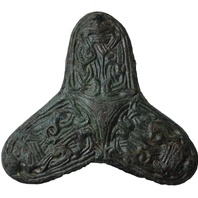
Viking Objects
Trefoil brooch (LCNCC : 2011.99)
A trefoil brooch with Borre/Jellinge-style cast ornament belonging to Peterson’s type 109. The brooch is most probably cast of copper alloy with traces of gilding on its upper surface and white metal plating on the reverse. While of Scandinavian design, many examples found in the East Midlands were probably made in the Danelaw, and may have been copies of Scandinavian styles, instead of being imported from Scandinavia. For more information on Scandinavian jewellery in England check out our blog: Brooches, Pendants and Pins: Scandinavian Dress Accessories in England.
Read More
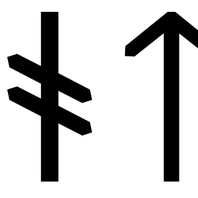
Viking Names
Fot
The Old Norse male personal name Fótr is the name of a fairly prolific Swedish rune-carver and is found elsewhere in Scandinavia. In England, the name occurs in several place-names in Lincolnshire (Fotherby, Fosdyke and Foston), Foston, Leicestershire, and possibly in another Foston in Derbyshire. In Fotherby, the place-name preserves the original Old Norse genitive singular ending (ie. as in Fótar). Such clear indications of Old Norse grammar survive relatively rarely in modern forms of place-names. Originally, Fótr was a by-name, meaning ‘foot’.
Read More

Viking Names
Welby
Welby, in the Framland Hundred of Leicestershire, is a Scandinavian compound from the Old Norse male personal name Āli and the Old Norse element by ‘a farmstead, a village’.
Read More
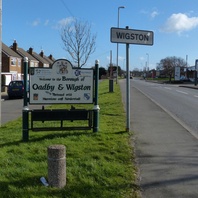
Viking Names
Oadby
Oadby, in the Guthlaxton Hundred of Leicestershire, likely comes from the Old Norse male personal name Auði (Old Danish Øthi) which appears as Owði in the Liber Vitate of Thorney Abbey. A potential alternative for the first element is Old Norse auðr ‘wealth, riches’, which might refer to the easily worked and fertile glacial sand and gravel on which Oadby lies. The second element of the place-name is Old Norse by ‘farm, settlement’. It is now a joint village with Wigston Magna.
Read More
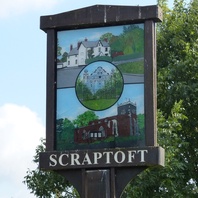
Viking Names
Scraptoft
There are two possibilities for the first element of Scraptoft, in the Gartree Hundred of Leicestershire. The first suggestion is that it is the Old Norse male personal name Skrápi (genitive singular Skrápa). Alternatively, the specific could be the Old Norse element skrap ‘scraps, scrapings’ potentially referring to arid barren soil which may be related to Modern Norwegian skrapmark ‘land thinly covered by grass’. This would be topographically appropriate as the settlement lies on a small area of sand and gravel on top of boulder clay. The second element of the name is Old Norse toft ‘building plot, homestead, curtilage’.
Read More
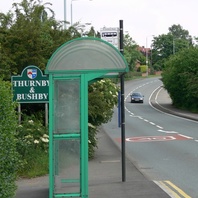
Viking Names
Thurnby
Thurnby, in the Gartree Hundred of Leicestershire, probably derives from Old Norse þyrne, þyrnir, þyrni ‘a thorn-bush’ and Old Norse by ‘a farmstead, a village’. It is also possible that the specific element is the Old Norse byname Þyrnir. However, when taken with the neighbouring parish Bushby these names appear to record an area of former scrubland. This land remained poorly exploited until the period of Scandinavian settlement. Some earlier spellings of the name show substitution of Old English þorn ‘a thorn-tree’ as the first element. Thurnby is now a joint parish with Bushby.
Read More

Viking Names
Ketsby
Ketsby, in the Hill Wapentake of Lincolnshire, comes from the Old Norse male personal name Ketill and the Old Norse element by ‘farmstead, village’. It is a joint parish with South Ormsby.
Read More
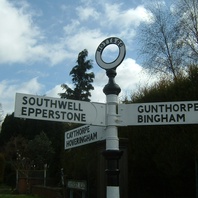
Viking Names
Caythorpe
Caythorpe, in the Thurgarton Wapentake of Nottinghamshire, probably comes from the Old Norse male personal name Káti and the Old Norse element þorp ‘outlying farm, settlement’. There is also a Caythorpe in Lincolnshire.
Read More

Viking Names
Gunness
Gunness, in the Manley Wapentake of Lincolnshire, is an Old Norse compound from the male personal name Gunni and nes ‘a ness, a headland, a promontory’. The name is topographically appropriate as it is located on a marked promontory on the River Trent. The same personal name also occurs in Gunby and Gunthorpe, Lincolnshire.
Read More

Viking Names
Risby
Risby, in the West Riding of Lindsey in Lincolnshire from Old Norse hrís ‘shrubs, brushwood’ and Old Norse by ‘A farmstead, a village’. This name is found as Rejsby and Risby in Denmark and it is possible that the place-name is transferred from there. If this is the case it was presumably because it is topographically appropriate for the English name as for the Danish. Risby is a joint parish with Roxby.
